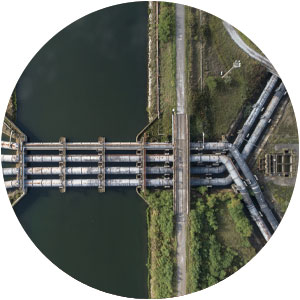Water resources answer to the laws of nature, not to human beings. Any business missing this, risks paying a hefty price.

The cost of water to a business may seem relatively small compared to energy costs, particularly given recent hikes in energy bills.
But how well do businesses understand the risks and potential costs of interruptions to the amount and quality of their water abstractions and discharges?
Operations that run 24/7/365 and rely on uninterrupted supply and disposal of process water are particularly at risk. Environmental factors such as climate change, drought and flooding, as well as enforcement action from environmental regulators in the event of non-compliance with permit conditions, all need to be taken into account.
Water abstractions or discharges are inherently exposed to risks associated with the variable nature of the environment in which they are located.
An abstraction licence is no guarantee of future water availability. External factors can result in a discharge being polluting, even when compliant with the numerical terms of its consent.
Crossing our fingers and hoping for the best is not a solution.
Recent examples encountered by WHS staff:
- Metal manufacturer – Water efficiency measures on site increased constituent concentrations in discharges, exposing the manufacturer to potential prosecution, fines and administrative costs.
- Sandwich producer – Intermittent wash downs of the production area caused spikes in concentrations of discharge constituents, followed by over-design of corrective action and under valuing of the asset.
- Chemical works – Generators in a basement were knocked outby a flood event, cutting back-up electricity supply to a water treatment facility.
- Yoghurt manufacturer – Inadequate borehole depth and elevation of the borehole pump for groundwater abstraction resulted in lack of drought resilience, leaving the manufacturer vulnerable to drops in groundwater levels.
- Brewery – Inadequate flood protection around groundwater abstraction headworks resulted in contamination by cow faeces from an adjacent field during flooding.
- Abattoir – Raised levels of ammonia and BOD (biological oxygen demand) concentrations in an adjacent stream resulted in alleged breach of the lagoon permit to discharge to groundwater and threat of site closure.
Regulatory risks
Risks to water abstractions and discharges may be further compounded by conservatively led, risk-based regulation of the water environment.
Risk-based regulation is a long-established principle across the UK and rightly so. However, applying a risk-based approach to the regulation of water abstractions and discharges commonly means the use of overly conservative methodologies.
There is also a lack of the expertise necessary to support a more in-depth, value-added and sustainable assessment of the criteria involved. Targeted data is often lacking and/or experience concerning low and high flow conditions, and constituent behaviour in the water environment.
A conservative approach may be convenient, but it has created a legacy of onerous conditions, potentially costly dependencies and, in the worst case, prosecution risks.
Analysis of site-specific water availability in the context of both historical and climate change variability in water resources, is called for, alongside modelling of business-specific usage. These can provide valuable insights into the applicability and resilience of current regulatory requirements for businesses.
The last word
WHS can help any business unclear on the risks associated with reliance on water abstraction and effluent discharge, and their potential cost.
We help businesses understand and manage risks and costs, enabling them to add value by avoiding costly interruptions.
If you want to explore these issues for your own business, we’d love to hear from you. We offer an initial no-obligation conversation to learn about your business and how we can help you.
Our unique cutting-edge methods and software, widely used as best practice by regulators, combined with decades of knowledge and experience in the water environment, are just a phone call away.
For more information, contact Duncan Russell WHS Technical Director, Hydrology & Hydrogeology.
Mobile 07549 018136
Email duncan.russell@hydrosolutions.co.uk